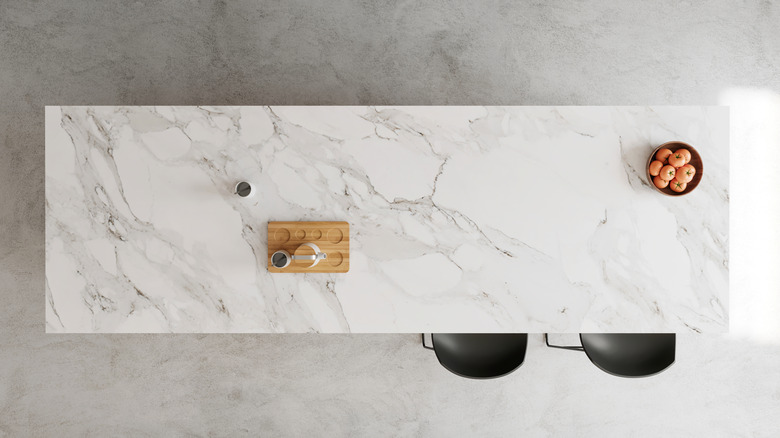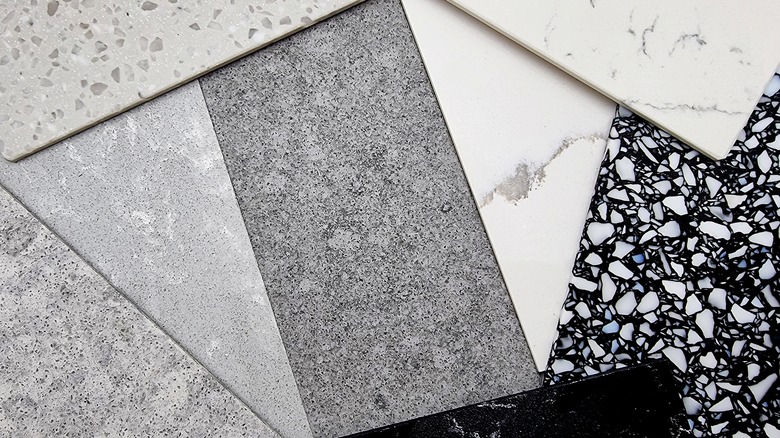HGTV's Mina Starsiak Hawk Loves This Expensive Marble (But Swears By One Affordable Alternative)
As one of the stars of HGTV's series "Good Bones," Mina Starsiak Hawk has renovated a lot of kitchens. She's assessed every type of situation and worked with all sorts of budgets to plan, design, and remodel various spaces both to meet customers' needs and to create a beautiful design. Over the years, Mina Starsiak Hawk has developed favorite materials and products to work with, and countertops are no exception. Her favorite countertops are made of Carrara marble, but for a more budget-friendly option, she often opts for quartz instead.
Kitchen countertops are one of the most critical and most costly aspects of any kitchen remodel, after cabinets and appliances. They need to be aesthetically pleasing while also being sturdy enough to handle all the abuse counters receive over the years, from spills to cuts to shattering objects. Your best bet is to go with a material that is resistant to germs, easy to clean, and able to withstand the slings and arrows of outrageous cooking. However, cost is always a factor in these decisions too, so if you can't afford the top-of-the-line, it's important to have an affordable alternative.
The pros and cons of Carrara marble
Carrara marble countertops are carved from a single block of natural stone and have lovely blue-gray veins running through the white, making every piece uniquely patterned. Indeed, the beauty of classic marble is unmatched in terms of elegance, and if you feel marble is an absolute must, Carrara is more affordable than other variations. It's also heat resistant and will bring its own personality to your kitchen over time. Unfortunately, that personality comes from its delicate nature. Mina Starsiak Hawk pointed out to House Beautiful, "Anyone who knows me knows that I'm in love with Carrara marble — it's just beautiful, but it's getting more expensive and it's a lot more difficult to maintain."
As a porous, "soft" stone, Carrara marble is easily scratched, gouged, dented, chipped, stained, and dulled. When installed, the marble countertop should be professionally sealed to prevent — or at least lessen the impact of — serious damage, but this sealing needs to be repeated every six months, especially if your counters get a lot of food prep use. The supplemental sealing can be a DIY project, but it's still a lot of maintenance to keep your counters looking their best. Even then, be prepared to accept scratches and imperfections as a fact of life, hopefully viewing them as character traits and mementos of your time in the kitchen.
Quartz countertops are more durable and less costly
Mina Starsiak Hawk considers quartz an excellent alternative to marble when buying new countertops. She used this in her own home in Indiana and told House Beautiful that statuario quartz is her favorite alternative to her beloved Carrara marble. Starsiak Hawk says, "It has the same creamy look but it's more durable and easier to take care of," and has been using it in a lot of her remodels as a result.
Quartz, while a natural stone in its own right, is actually mixed with a binding agent of about 7% polymer resins when made into countertops. They're also available in a wide range of colors and patterns but can be purchased to look just like marble. Highly recommended by the folks at the Good Housekeeping Institute, quartz countertops are incredibly durable and long-lasting. They are stain and scratch-resistant, and if you opt for rounded corners (which you should), it lowers the chances of the edges chipping off. Moreover, unlike Carrara marble, quartz countertops don't require sealing at any time, though spills should still be dealt with quickly. The non-porous nature of the quartz stone, however, prevents a lot of those spills and falls from leaving marks. Simply use a non-abrasive cleanser to keep it sparkling, and your quartz countertop should last for decades.


